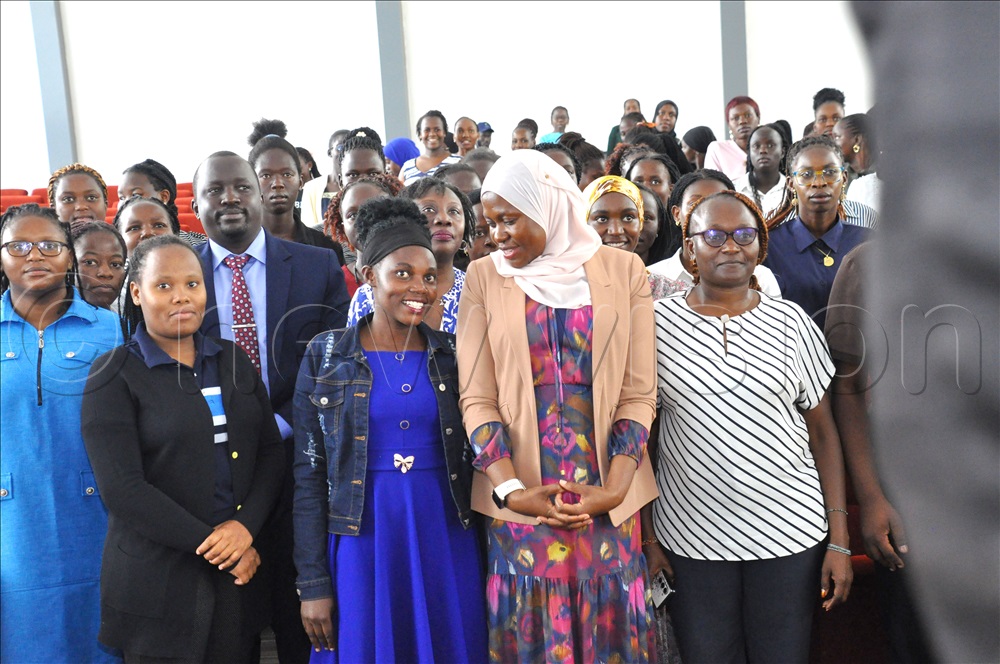Over 250 university students train under govt digital skilling initiative to tackle youth unemployment
Ministry of ICT and National Guidance permanent secretary Dr Aminah Zawedde says the programme seeks to turn digital familiarity among youth into employable skills.
Dr Aminah Zawedde Permanent Secretary Ministry of ICT addressing participants during the digital skilling training for women at National ICT innovation Hub on July 15, 2025. (Photos by Nancy Nanyonga)
By John Masaba
Journalists @New Vision
________________
More than 250 university students have benefited from a new government-backed digital skilling programme aimed at addressing youth unemployment and bridging the gender digital divide in the country.
The students, who form the first cohort of the initiative, were selected from five public universities across the country—Busitema University, Gulu University, Muni University, Makerere University Business School (MUBS), and Mbarara University of Science and Technology (MUST).
Ministry of ICT and National Guidance permanent secretary Dr Aminah Zawedde says the programme seeks to turn digital familiarity among youth into employable skills.
“Many of our young people are active on social media and have access to digital tools. However, they are not using these tools to create employment opportunities. This programme is designed to change that,” she says.
Zawedde explains that the training covers both technical and soft skills necessary for success in the digital economy, such as content creation, cybersecurity, data analytics, social media management, and entrepreneurship.
“The goal is to help young women translate their digital fluency into job creation and innovation,” she says, adding that the programme is expected to yield at least 10 supported startup ideas, with at least five fully incubated by the end.
Aminah Zawedde Permanent Secretary Ministry of ICT interacting with some of the participants during the digital skilling training for women at National ICT innovation Hub on July 15, 2025. 
She was speaking at the programme launch at the National ICT Innovation Hub in Nakawa, Kampala on July 15, 2025.
According to the Economic Policy Research Centre (EPRC), over 41% of Ugandan youth are not in employment, education, or training (NEETS) — a statistic that underscores the urgency of such interventions. Among university graduates, especially young women, there is a notable gap between digital awareness and actual employability or entrepreneurial readiness.
“Even as jobs move online, many youth lack the capacity to take advantage of digital work opportunities,” said Dr Zawedde, adding that through this initiative, students will not only gain digital skills but also receive coaching on how to identify business opportunities and create value from them.
Opportunities for women
Makerere University Business School principal Prof. Moses Muhwezi emphasised the programme’s gender-responsive approach, noting that women typically spend more time on unpaid household work, limiting their availability for formal employment.
“Women often juggle unpaid care responsibilities like cooking and cleaning, which reduces the time they can dedicate to paid employment. But with digital skills, they can work from home, earn a living, and still care for their families,” he said.
MUBS Entrepreneurship, Innovation, and Incubation Centre director Dr Diana Ntamu said the programme, dubbed Entrepreneurship Digital Skills for Employment of Women (EDEW), was designed to address the twin challenges of graduate unemployment and lack of job-creation capacity.
“Every year, universities produce thousands of graduates who cannot find jobs, and yet many lack the skills to create their own. This programme combines entrepreneurial training with digital upskilling to close that gap,” she said.
She highlighted that many young people are already engaging with digital platforms like TikTok, LinkedIn, and Facebook, but often lack the knowledge to use them productively.
“There’s a lot of untapped potential. Some young women are passionate, skilled, and creative, but they lack the tools and confidence to monetize those talents. This programme provides that missing link,” Ntamu said.
Gender digital divide
Ntamu noted that young women are especially vulnerable to digital exclusion due to limited access and fewer opportunities to develop relevant skills. This puts them at risk of exploitation or forces them into unsafe income-generating activities.
“If a girl cannot use her phone or computer productively, she may be pushed into situations that compromise her safety and future. That’s why we specifically target young women. The digital divide is wider for them,” she said.
By teaching them to leverage mobile phones, tablets, and computers for entrepreneurship, the programme empowers female students to begin earning even before graduation.
“We’re not just training them to be employees. We’re helping them identify opportunities in their homes, campuses, and communities—and build solutions using the digital tools they already have,” Ntamu said.
She added that the initiative contributes to national goals on gender equity, youth employment, and inclusive economic growth.
Entrepreneurial mindset
A specialised curriculum has been developed to support the programme, focusing on modules including entrepreneurial mindset development, professional digital communication, digital branding, cyber safety, and basic data analysis.
“We believe the entrepreneurial mindset is essential to changing how young people perceive work. The skills offered through this programme will empower them to become job creators rather than just job seekers,” Ntamu said.
“This programme specifically targets young women, as they are more likely to face barriers to employment and digital participation,” she added. “We want to raise a generation of digitally empowered, independent, and productive young women who can contribute meaningfully to Uganda’s economy.”
The three-month programme is delivered in a blended format—combining online and in-person learning—and is expected to scale up in subsequent phases to benefit more students across the country.
The programme is being implemented by the Ministry of ICT and National Guidance in collaboration with Makerere University Business School, with support from the European Union. It offers training, mentorship, and coaching in key digital and entrepreneurial skills tailored to female university students.
The initiative aligns with Uganda’s National Digital Transformation Roadmap (2023–2027), which seeks to digitise government services, enhance digital infrastructure, and promote inclusive innovation. The roadmap prioritises digital literacy, cybersecurity, innovation, and data protection as pillars of a tech-driven economy.
